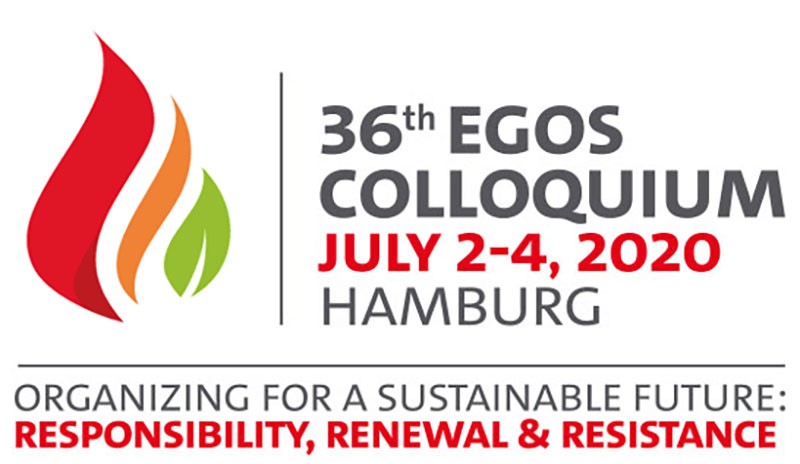Sub-theme 37: Organizing for Responsibility: The Role of Ethics, Strategies, and Capabilities in Contradictory Environments
Call for Papers
The 36th EGOS Colloquium in 2020 calls upon “organizations and the organized… to address a broad variety of questions on
how to perform economic /and other/ activities in a responsible manner”, emphasizing the dilemmas and contradictions related
to that seemingly simple imperative.
This sub-theme addresses the contradictions and conflicts between the
rhetoric and policies of public and private organizations – corporate social responsibility statements, personal integrity
policies, certification programs, anti-corruption policy templates – and their actual behavior in situations characterized
by time pressure, career interests, resource scarcity and intense competition (Harley, 2019). Recent reports highlight how:
R&D organizations may espouse strong scientific norms, but at the same time encourage or condone questionable practices and neglect whistleblower alarms (Berggren & Karabag, 2018; Karabag & Berggren, 2016);
Social media giants advertise their mission to build community and bring the world together but disregard the integrity of their users and exploit their personal data (cf. Brusoni & Vaccaro, 2017);
Consumer brands invest in broad ethics codes while workers at their sub-contractors don’t earn a sustainable living wage (Yu, 2008);
Car firms develop attractive products which pass stringent regulatory tests, but at the same time equip them with software which manipulates the very same tests (Rhodes, 2016);
Companies in materials-intensive industries engage in exploitation of resources in far-away locations in spite of human rights violation and risks of ecological destruction (Adeola, 2017; Özen & Akkemik, 2012);
Banks officially adhere to financial transparency and responsibility, while at the same time collude with grey-zone actors to help customers with money laundering and tax evasion (Harding, 2016; Sikka, 2010);
Hybrid organizations struggle to reconcile the conflicts between economic efficiency and the social objectives they were set up to address (Ramus et al., 2017).
In spite of these transgressions, this sub-theme builds on the convictions that actors
and institutions, the organized and their organizations are able to change and build skills, values, and strategies which
take the responsibility imperative seriously in technology development, as well as in marketing, manufacturing, supply management,
etc. Thus, we invite all researchers who are interested in the formation of capabilities, values, and strategies which support
responsible behavior, from norm subscription in research groups and professional associations to structural and institutional
arrangement in major organizations.
The sub-theme welcomes conceptual, empirical and methodological contributions,
from micro-level studies of individual/group interaction to macro-oriented analyses of organizations, networks, and industries.
We particularly invite contributions that focus on one or more of the following issues:
What capabilities and strategies do organizations, which operate multi-layered global supply chains, need to enforce sustainable social standards in their ecosystem?
In what ways can ethical values and infrastructures guide technological development, from advanced engineering to product realization?
How can R&D organizations nurture capabilities and values which support strong ethical standards, and resist the use of questionable practices which may lead to rapid, but potentially harmful results?
What means may turn CSR programs into operational realities which make substantive differences to employees, customers, and external stakeholders?
What strategies, capabilities and alliances are important for firms in rapidly growing industries, which depend on scarce mineral resources, to minimize reliance on socially and ecologically destructive locations?
How can international firms build capabilities and strategic values which help them to detect and avoid corrupt practices on markets controlled by authoritarian regimes?
Under what circumstance do new digital technologies enhance unethical versus ethical practices and forms in organizations?
How does institutional complexity/competing institutional logic influence opportunities for ethical versus unethical technology development in organizations?
The sub-theme intends to foster an exchange of theoretical ideas and empirical
research across these and related topics and is open to contributions that are ready to be submitted to a research journal
as well as research in progress. It will create rich opportunities for engaging in constructive dialogue and learning among
all participants.
References
- Adeola, F.O. (2017): “Environmental Injustice and Human Rights Abuse: The States, MNCs, and Repression of Minority Groups in the World System.” In: S. Vanderheiden (ed.): Environmental Rights. London: Routledge, 3–23.
- Berggren, C., & Karabag, S.F. (2018): “Scientific misconduct at an elite medical institute: The role of competing institutional logics and fragmented control.” Research Policy, 48 (2), 428–443.
- Brusoni, S., & Vaccaro, A. (2017): “Ethics, Technology and Organizational Innovation.” Journal of Business Ethics, 143 (2), 223–226.
- Harding, L. (2016): “What are the Panama Papers? A guide to history’s biggest data leak.” The Guardian, April 3, 2016, https://www.theguardian.com/news/2016/apr/03/what-you-need-to-know-about-the-panama-papers
- Harley, B. (2019): “Confronting the Crisis of Confidence in Management Studies: Why Senior Scholars Need to Stop Setting a Bad Example.” Academy of Management Learning & Education, 18 (2), 286–297.
- Karabag, S.F., & Berggren, C. (2016): “Misconduct, Marginality and Editorial Practices in Management, Business and Economics Journals.” PLoS ONE, 11 (7), e0159492, https://doi.org/10.1371/journal.pone.0159492
- Özen, Ş., & Akkemik, K.A. (2012): “Does illegitimate corporate behaviour follow the forms of polity? The Turkish experience.” Journal of Management Studies, 49 (3), 515–537.
- Ramus, T., Vaccaro, A., & Brusoni, S. (2017): “Institutional complexity in turbulent times: Formalization, collaboration, and the emergence of blended logics.” Academy of Management Journal, 60 (4), 1253–1284.
- Rhodes, C. (2016): “Democratic Business Ethics: Volkswagen’s Emissions Scandal and the Disruption of Corporate Sovereignty.” Organization Studies, 37 (10), 1501–1518.
- Sikka, P. (2010): “Smoke and mirrors: Corporate social responsibility and tax avoidance.” Accounting Forum, 34 (3–4), 153–168.
- Yu, X. (2008): “Impacts of corporate code of conduct on labor standards: A case study of Reebok’s athletic footwear supplier factory in China.” Journal of Business Ethics, 81 (3), 513–529.


